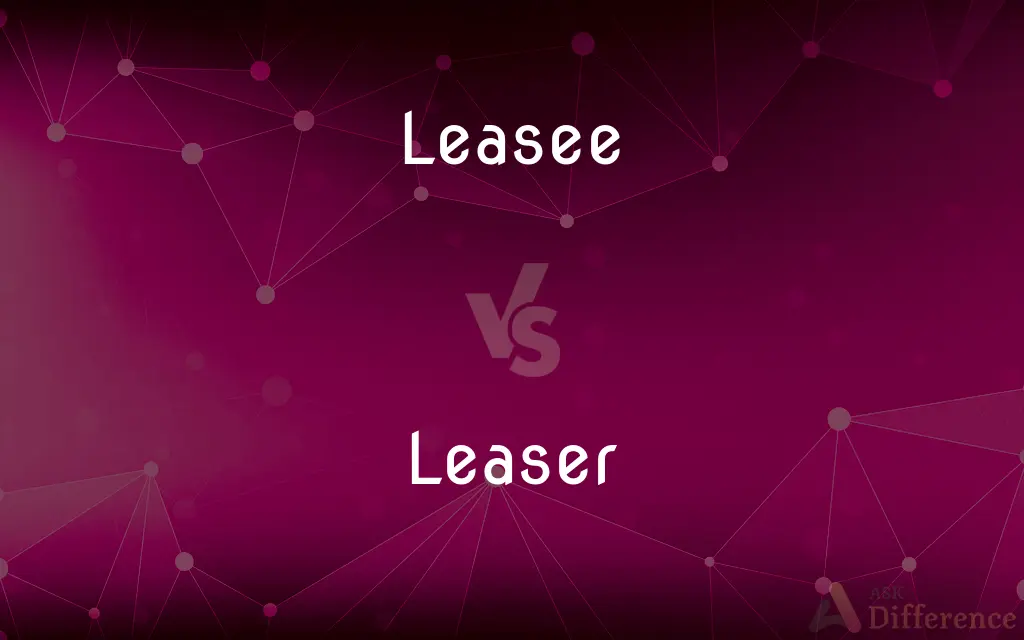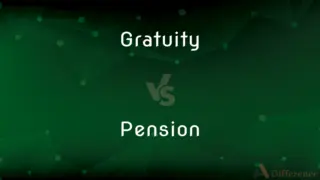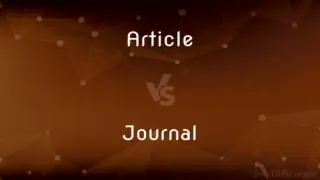Leasee vs. Leaser — What's the Difference?
Edited by Tayyaba Rehman — By Fiza Rafique — Updated on April 3, 2024
A lessee is the party that rents or leases property from another, while a lessor is the one who owns the property and leases it out.

Difference Between Leasee and Leaser
Table of Contents
ADVERTISEMENT
Key Differences
A lessee enters into an agreement to rent or lease property, often for a specified period, indicating the party's role as the recipient of the lease. On the other hand, a lessor is the party that grants the lease, essentially the owner or manager of the property who provides the lessee with the rights to use it under agreed terms.
The lessee is responsible for adhering to the terms of the lease, which might include payments, maintenance, and other conditions specified in the lease agreement. Whereas the lessor must ensure the property is in good condition for use as promised and must uphold their part of the agreement, such as not infringing on the lessee's rights to use the property.
In financial terms, the lessee often records the lease as an asset or liability, depending on the lease type (operating or finance lease). Conversely, the lessor retains ownership of the asset and may recognize income from leasing it out, along with certain responsibilities for the asset's maintenance and insurance.
Lessee rights typically include the use of the property for the lease duration and may also involve options to renew the lease, purchase the property, or make certain modifications. On the flip side, lessor rights include receiving lease payments, repossessing the property at lease end or upon violation of lease terms, and sometimes assessing penalties for early termination.
The relationship between a lessee and a lessor is symbiotic, with the lessee gaining the right to use the property, while the lessor receives compensation for this use. However, their roles and responsibilities are distinctly opposite, with the lessee as the user and the lessor as the provider.
ADVERTISEMENT
Comparison Chart
Definition
The party that leases or rents property.
The owner of the property who leases it out.
Responsibility
Adhering to lease terms, including payments.
Providing a property that meets agreed terms.
Financial Role
May record the lease as an asset or liability.
Recognizes income from leasing out the asset.
Rights
Use of property, options to renew or purchase.
Receiving payments, repossessing the property.
Relationship
Recipient of the right to use the property.
Provider of the property and leasing rights.
Compare with Definitions
Leasee
A party that rents property under a lease agreement.
The lessee agreed to pay monthly rent for the apartment.
Leaser
Owner renting out property.
The leaser (lessor) owns several rental properties in the city.
Leasee
Someone who holds a lease to land or premises.
The lessee uses the land for agricultural purposes.
Leaser
Responsible for major repairs.
As the leaser (lessor), she must replace the building's roof.
Leasee
The recipient in a lease contract.
The lessee received the keys to the leased vehicle upon signing the agreement.
Leaser
Retains property ownership and benefits.
The leaser (lessor) benefits from property value appreciation over time.
Leasee
An individual or entity occupying or using leased property.
As a lessee, she is responsible for minor repairs.
Leaser
Sets the lease terms and conditions.
The leaser (lessor) specifies no pets in the lease agreement.
Leasee
A tenant in a leased property.
The lessee must abide by the community's rules and regulations.
Leaser
Receives regular payments from the lessee.
He enjoys a steady income as a leaser (lessor) from his tenants.
Leasee
A person who leases something from a lessor; lessee.
Leaser
A contract granting use or occupation of property during a specified period in exchange for a specified rent or other form of payment.
Leaser
The term or duration of such a contract.
Leaser
To grant use or occupation of under the terms of a contract.
Leaser
To get or hold by such a contract.
Leaser
(nonstandard) One who leases or gleans; lessor.
The owner of the property is the leaser when they rent it by lease to a lessee.
Leaser
Leaseman.
Leaser
One who leases or gleans.
Leaser
A liar.
Common Curiosities
Are lessees responsible for property insurance?
Lessees may be responsible for renter's insurance, while the leaser (lessor) typically covers the property insurance. This can vary based on the lease agreement.
Who is a leaser?
A leaser, more accurately referred to as a lessor, is the owner of an asset that is being rented or leased out to another party.
Can the terms of a lease agreement be negotiated?
Yes, the terms of a lease agreement, including rent, duration, and responsibilities, can be negotiated between the lessee and the leaser (lessor) before signing.
What happens if a lessee violates the lease agreement?
If a lessee violates the agreement, it can lead to penalties, eviction, or legal action, depending on the terms specified in the lease.
What are the advantages of being a leaser (lessor)?
Advantages include receiving a steady income from the property and potential property value appreciation.
How is a lease agreement terminated?
A lease can be terminated at the end of its term, by mutual agreement, or due to a breach of terms, among other conditions.
Who is responsible for maintenance and repairs in a lease?
The lease agreement outlines responsibility for maintenance and repairs, usually with lessees handling minor issues and leasers (lessors) major ones.
Can a lessee renew a lease agreement?
Yes, if the lease agreement includes a renewal option or if both the lessee and the leaser (lessor) agree to extend the lease.
Can a lessee sublease the property to someone else?
Whether a lessee can sublease the property depends on the terms of the original lease agreement with the leaser (lessor).
What are the benefits of being a lessee?
Benefits include using the asset without owning it, avoiding depreciation costs, and flexibility in terms of relocation or upgrading.
What is a lessee?
A lessee is the party that rents or leases an asset, such as property or equipment, under a lease agreement.
Does a lessee have rights to make changes to the property?
Any changes to the property by the lessee typically require the leaser’s (lessor's) consent, according to the lease agreement.
What is a security deposit?
A security deposit is money paid by the lessee to the leaser (lessor) at the start of the lease as insurance against damage or non-payment.
How does leasing affect taxes for the lessee and leaser (lessor)?
Lessees can often deduct lease payments as expenses, while leasers (lessors) must report income received from leasing. Tax implications can vary widely.
Can a lessee be evicted before the lease term ends?
Yes, a lessee can be evicted for reasons such as non-payment of rent or violating lease terms, depending on local laws and the agreement.
Share Your Discovery

Previous Comparison
Room vs. Board
Next Comparison
Conjecture vs. InferenceAuthor Spotlight
Written by
Fiza RafiqueFiza Rafique is a skilled content writer at AskDifference.com, where she meticulously refines and enhances written pieces. Drawing from her vast editorial expertise, Fiza ensures clarity, accuracy, and precision in every article. Passionate about language, she continually seeks to elevate the quality of content for readers worldwide.
Edited by
Tayyaba RehmanTayyaba Rehman is a distinguished writer, currently serving as a primary contributor to askdifference.com. As a researcher in semantics and etymology, Tayyaba's passion for the complexity of languages and their distinctions has found a perfect home on the platform. Tayyaba delves into the intricacies of language, distinguishing between commonly confused words and phrases, thereby providing clarity for readers worldwide.















































